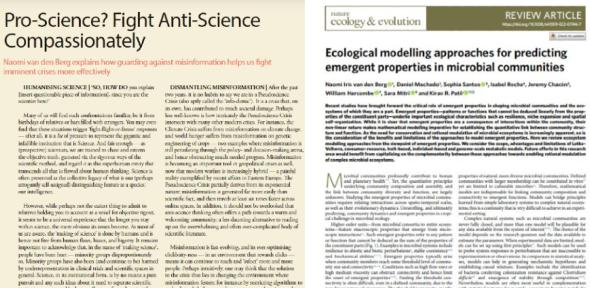
Submitted by Yolibeth López ... on Sun, 05/06/2022 - 12:08
Congratulations to Naomi van den Berg, 2020 cohort PhD student on the SBS DTP programme, for publishing two articles, "Pro-Science? Fight Anti-Science Compassionately" in Bluesci and, "Ecological modelling approaches for predicting emergent properties in microbial communities" in Nature Ecology & Evolution.
Pro-Science? Fight Anti-Science Compassionately
Pseudoscience and misinformation comprise an increasingly concerning crisis, also aptly called the ‘info-demic’. In this article, Naomi argues why properly tackling this crisis requires an interdisciplinary and compassionate approach (unlike approaches that end up further polarising an already very polarised society).
To read the full publication, please click here
Link to organisation Naomi represents:
https://cusap.org/
Ecological modelling approaches for predicting emergent properties in microbial communities - van den Berg, N., Machado, D., Santos, S. et al
Recent studies have brought forward the critical role of emergent properties in shaping microbial communities and the ecosystems of which they are a part. Emergent properties—patterns or functions that cannot be deduced linearly from the properties of the constituent parts—underlie important ecological characteristics such as resilience, niche expansion and spatial self-organization. While it is clear that emergent properties are a consequence of interactions within the community, their non-linear nature makes mathematical modelling imperative for establishing the quantitative link between community structure and function. As the need for conservation and rational modulation of microbial ecosystems is increasingly apparent, so is the consideration of the benefits and limitations of the approaches to model emergent properties. Here we review ecosystem modelling approaches from the viewpoint of emergent properties. We consider the scope, advantages and limitations of Lotka–Volterra, consumer–resource, trait-based, individual-based and genome-scale metabolic models. Future efforts in this research area would benefit from capitalizing on the complementarity between these approaches towards enabling rational modulation of complex microbial ecosystems.
To read the full publication, please click here
van den Berg, N.I., Machado, D., Santos, S. et al. Ecological modelling approaches for predicting emergent properties in microbial communities. Nat Ecol Evol (2022).


